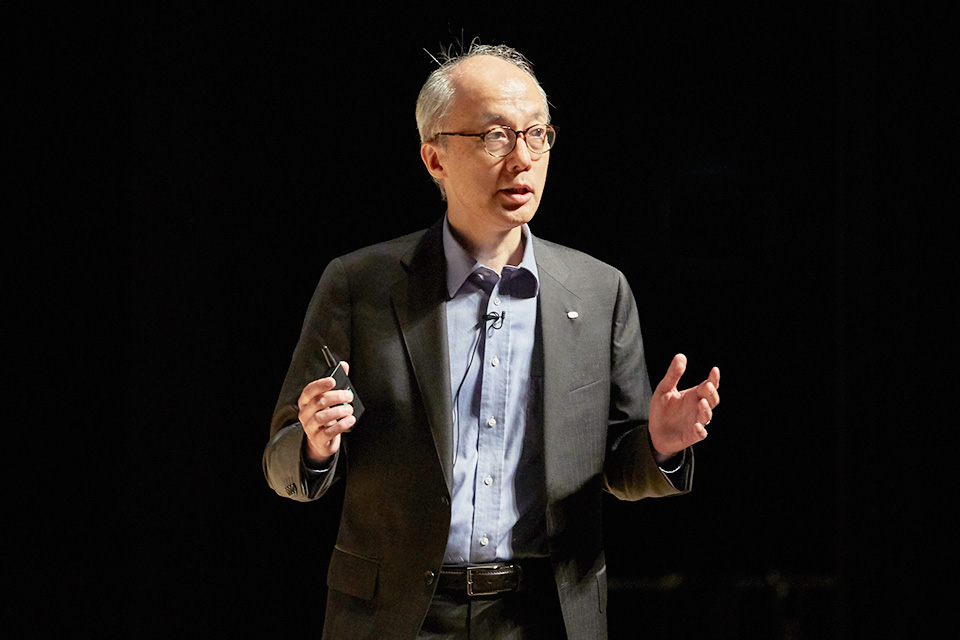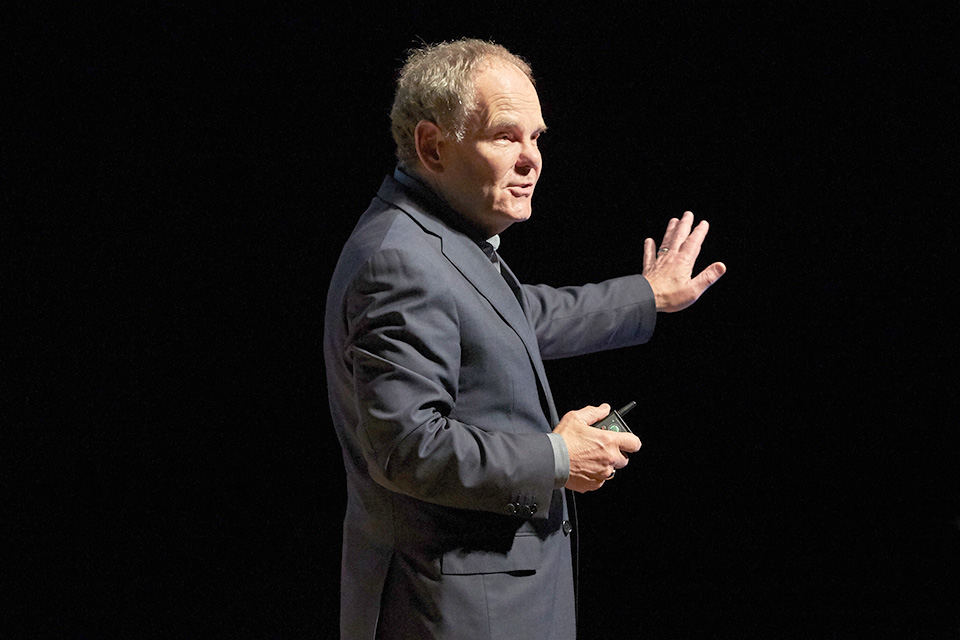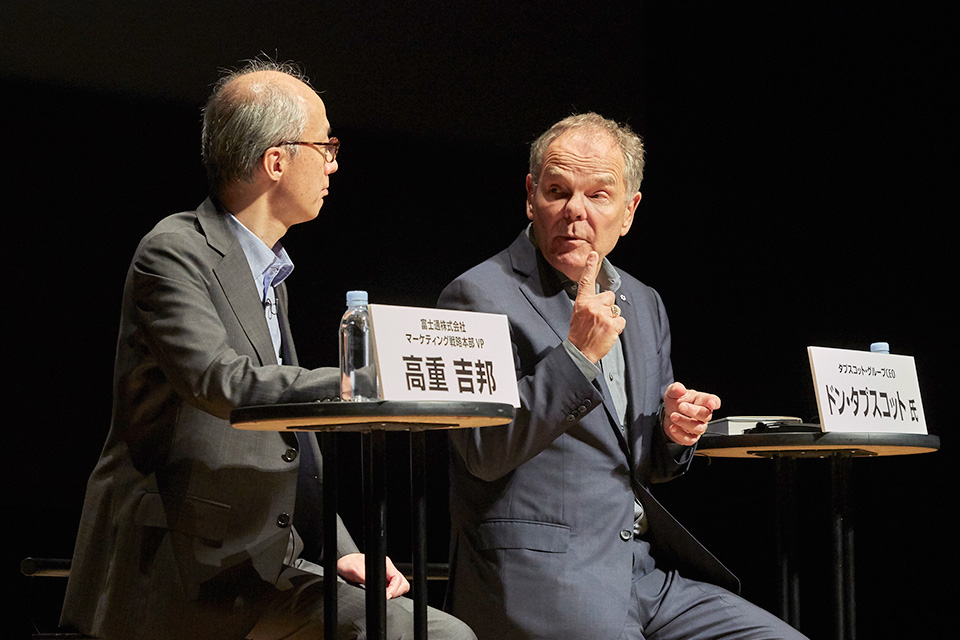Digital Enables Disruptive Visions
How to co-create the future and how to leverage the huge potential of the Blockchain
Digital technology is fundamentally changing our everyday lives, society, and industry. What kind of strategies should business leaders take to survive in this disruptive time?
Don Tapscott, CEO of The Tapscott Group Inc., visited Japan for the first time in ten years. He shared his visionary insights to 1,000 audiences, placing a special emphasis on Blockchain. Mr. Tapscott is globally renowned as the author of the international bestsellers, such as Wikinomics and Blockchain Revolution, as well as the world's fourth most influential management thinker according to Thinkers50. He also had a session with Yoshikuni Takashige, VP of Marketing Strategy and Vision at Fujitsu Limited, who is responsible for crafting Fujitsu's vision and value proposition. Their session on how to co-create the future and how to leverage the huge potential of the Blockchain was a must-see for senior management executives.

Co-creating a disruptive future
 Yoshikuni Takashige
Yoshikuni Takashige
VP, Marketing Strategy and Vision, Fujitsu Limited
First, Yoshikuni Takashige took the stage to give a presentation on the major changes driven by digital technology and Fujitsu's vision.
"Disruption" means departing from the current model to create a fundamentally new business model or a new society. However, creating disruptive innovations is very difficult especially while managing existing businesses at the same time, and may even be awfully painful.
Takashige opened with these words: "Today, predicting the future is becoming more difficult than ever. According to our own global survey, 75% of business leaders responded that their industries would fundamentally change in the next five years. More than half even thought their organizations would not be in the same form in five years. However, they are not pessimistic; many see digital disruption as an opportunity. 89% have already embarked on the journey of digital transformation. New digital technologies such as IoT, AI, and Blockchain are being embedded into the core value creation processes of businesses and society, bringing about non-linear changes. This is digital disruption."
Digital technology blurs conventional borders of organizations as well as industries. Companies, their partners and people (consumers) are being connected to form an ecosystem, enabling them to co-create new values which people truly want. For example, instead of supplying industrial products like automobiles, such a new ecosystem will collaboratively deliver value of mobility. Fujitsu calls such ecosystems "digital arenas". Today, being a vertically integrated enterprise no longer has much value.
Takashige stressed that "Shaping your disruptive vision is the single most important thing in this digital era." He explained about specific examples: autonomous vehicles could eventually disrupt the notion of geographic distances by enabling anybody to enjoy on-demand mobility, and preventive medicine could substantially improve the quality of life. He said, "We all need to think about how we could deliver big impacts and outcomes to society using digital technology."
Takashige concluded his speech by stating that "Multiple digital arenas will be shaped for co-creating various values, such as better mobility and better quality of life. These arenas will not be stand-alone, but interconnected to deliver greater value for people. They will develop into a distributed and autonomous network society. We call this Human Centric Intelligent Society, which is Fujitsu's vision." He then asked Mr. Tapscott to take the stage.
Blockchain technology supporting the fourth industrial revolution
 Don Tapscott
Don Tapscott
CEO, The Tapscott Group Inc.
Next, Don Tapscott delivered his key note. Mr. Tapscott began with stating that "I am very excited to be here and I have a very big idea for you. We will be able to co-create a very new positive future through a new emerging technology. In fact the Internet is entering into the second era, moving from the Internet of Information to the Internet of Value." He said, "The industrial age is coming to an end." It lasted over 100 years and delivered standardized products for mass market. "Today, all institutions need to be rebuilt around this theme - co-creating and co-innovating the future, which Fujitsu is very helpful and communicating." He then emphasized, "Don't be customer-centric. Instead, co-innovate with your customers, engage them, and we can build a very different future."
Mr. Tapscott said, "We are now moving into the fourth industrial revolution, where technology infuses itself into everything and everybody." He emphasized, "Blockchain become the foundation of this fourth industrial age," in addition to the six technologies, AI (machine learning), autonomous vehicles, distributed energy, technology in our bodies, virtual reality, drone & robotics. Blockchain is the greatest innovation in computer science. Although some people misunderstand Blockchain is for the financial services industry because it is used as the underlying technology for bitcoin, it will impact all industries.
Mr. Tapscott pointed out that Blockchain will fundamentally change the Internet. For the last forty years, only copies of information were sent via the Internet. This is the Internet of Information. However, the conventional Internet has various problems, such as the double spend issue, the threat of hacking due to the use of conventional server technology, and the presence of intermediaries. On the other hand, Blockchain has the potential to realize the Internet of Value, which is fundamentally different. Instead of sending copies of information, Blockchain enables various real assets--such as money, credits, and music--to be transacted instantly and securely.
Mr. Tapscott explained: "Blockchain makes possible highly reliable peer-to-peer (P2P) transactions that are difficult to hack. In the case of Bitcoin, this is enabled by computers around the world called minors processing encrypted distributed ledgers at a total throughput of 20 to 50 times that of Google." He said, "My son Alex and I call Blockchain as Trust Protocol. But trust is not achieved by big intermediaries; it is achieved by cryptography, by collaboration, and by clever coding."
As a result, co-creation of value is no longer just a slogan, and vertically integrated industrial age corporations will either transform into open network enterprises or be disrupted. Then, eventually, "distributed value creation" will be realized.
Seven business models emerging with Blockchain
Mr. Tapscott introduced seven new typical open networked enterprise business models as scenarios of disruption enabled by Blockchain.
Blockchain Cooperatives:
If owners of rooms or cars can rent them through Blockchain by themselves, intermediaries become unnecessary. Although Uber and Airbnb may be seen as part of the sharing economy, they merely provide services as intermediary agents using existing mobile technologies. Blockchain will realize the true sharing economy.
The Rights Creators:
When an artist distributes a song using Blockchain and the song is used in a movie, that artist will get paid directly in consideration of the song. Their copyrights are protected, and they can monetize their songs.
The Re-Intermediators:
By using Blockchain, you can send money directly to the intended recipient without going through agents such as banks. Conventional intermediaries will need to deliver a new value proposition.
The Blockchain Supply Chain:
In addition to digital assets, other physical assets will also be tracked, improving supply chain efficiency. Smart contracts based on software code will enable quick transactions without requiring lawyers.
Animating the Internet of Things:
As the Internet of Information transforms into the Internet of Value, ledgers for managing all kinds of things connected by IoT will be necessary. Distributed ledgers using Blockchain will accelerate the development of IoT.
The Platform Builders:
By using Blockchain's distributed network, value can be co-created with customers in real time.
Bigger, Better Data:
Blockchain enables people to manage their own personal data by themselves. It will also become possible for people to monetize part of their own personal data while protecting their privacy.
Mr. Tapscott continued by saying that "This is the time of great change. All these institutions are moving away from an industrial model to a model of co-innovation and co-creation. We are moving from vertically integrated institutions to networks. We are moving from powerful intermediaries to peer to peer collaboration. The dream of P2P world is finally becoming possible." He strongly emphasized: "The new paradigm causes a leadership crisis. Leaders often face great difficulties embracing the new paradigm. Takashige-san was right, disruptions require leadership for change. The transformations of your companies and your governments are not CEO's jobs, or someone sitting next to you. Instead, it is your opportunity if you will."
Mr. Tapscott introduced the Blockchain Research Institute, a joint multi-million dollar research initiative on Blockchain that he launched. Global companies, governments, institutions and Blockchain startups have joined it. He said that Fujitsu is an important member of this initiative, and the initiative will enable Fujitsu to understand and exploit the huge opportunity brought about by the second era of the Internet.
At the end of his presentation, Mr. Tapscott talked about co-creation enabled by the trust protocol. With the image of large flocks of starlings flying across a prairie displayed on-screen accompanied by Pachelbel's Canon, he said: "Starlings come together and form murmurations through the murmuring of their wings, and chase away a hawk which is 25 times their size by the collective power of little birds. And there is no one leader of the flock. This is the trust protocol of the nature. What the flock has is the trust protocol built based on an understanding that the interests of the group are the interests of the individuals." He emphasized that by trusting each other, building a global platform, and co-creating, a whole new world of value will open up for corporations, society, and citizens. Mr. Tapscott concluded his presentation to unanimous applause.
What should you do to understand Blockchain and become a leader in the new era?

Following Mr. Tapsocot's presentation, he and Takashige further discussed the importance of Digital Co-creation and the potential of Blockchain.
First, when asked about his impression of the Fujitsu Forum and President Tanaka's keynote speech of the previous day, Mr. Tapscott remarked: "I had never before seen a presentation from a technology CEO in which he walked on stage with a bunch of vegetables; that was amazing. The idea that the new era of technology can radically change agriculture, the way we feed ourselves, was powerful. When I saw the stage where Fujitsu was actually working together with its partners, customers, suppliers, and so on to build the collective future, my impression of 'co-creation' changed; it was quite impressive." In response, Takashige said: "We are not merely talking about 'co-creation' as a concept; we must deliver tangible outcomes and value."
Next, Takashige asked: "Will every industry be affected by incorporating Blockchain?" Mr. Tapscott responded: "All industries will be affected." Mr. Tapscott mentioned Blockchain's potential is not only for financial services, manufacturing, retail, resources, and healthcare but also food, agriculture, and public services. As to the nature of government, he said: "Blockchain can change government into a platform for co-innovating public services and public value." He stressed that "Secure e-voting realized by Blockchain could reinvent even the system of democracy."
In response, Takashige commented: "Fujitsu is also working with governments to co-create projects, but the idea that the government can serve as a platform for co-creation or co-invention with the private sector is interesting." When asked about how to use Blockchain in combination with AI, Mr. Tapscott replied: "I think that AI--or machine learning--and Blockchain are the two big technologies. For AI to fundamentally change business and society, a transactional platform like Blockchain is needed to enable real assets to be handled." When Mr. Tapscott mentioned the potential of a Distributed Autonomous Enterprise and gave a specific example of a crowdfunding campaign, Takashige said: "Fujitsu is also examining the possibility of a totally new type of digital business workforce. By combining people's creativity with AI's analytical and autonomous capabilities, we are aiming to help people make better decisions and work more creatively."
Takashige asked: "I think that in particular, incumbent businesses are reluctant to accept a disruptive future; how can they embrace new innovation?" Mr. Tapscott replied: "If you are in the middle, it's time to do some serious re-strategizing. Every company must start thinking about what these new technologies mean for it." He recommended downloading a bitcoin wallet application to a mobile device and going to buy something because personal use is a precondition of comprehension. He also stressed that "Getting some pilot projects going to strategically think about what they mean or how they change marketing, manufacturing, supply chains, financial operations, and so on is important."
Takashige next asked: "Though the Internet of Information was led by Silicon Valley, who will lead Blockchain in what could be the Internet of Value?" Mr. Tapscott answered: "Well this is a very interesting question. I don't think Silicon Valley will lead the second era because they are locked into the old paradigm.... Today, Toronto in Canada, China, and Singapore are very active. And there is no reason why Japan or Tokyo couldn't be the actual leader of the second era of the Internet." Mr. Tapscott says that much remains to be done by companies, governments, venture capitals, incubators, and universities because we are in the same situation as the Internet in 1993. Takashige responded: "We need a new ecosystem for new technology and innovation to lead the next era."
Mr. Tapscott concluded the session with these words: "We have technologies that weren't there 20 years ago, and all preconditions for changes to happen at an explosive speed are in place. This is the very exciting time in human history, and I certainly wish you the very best in making the most of it."




